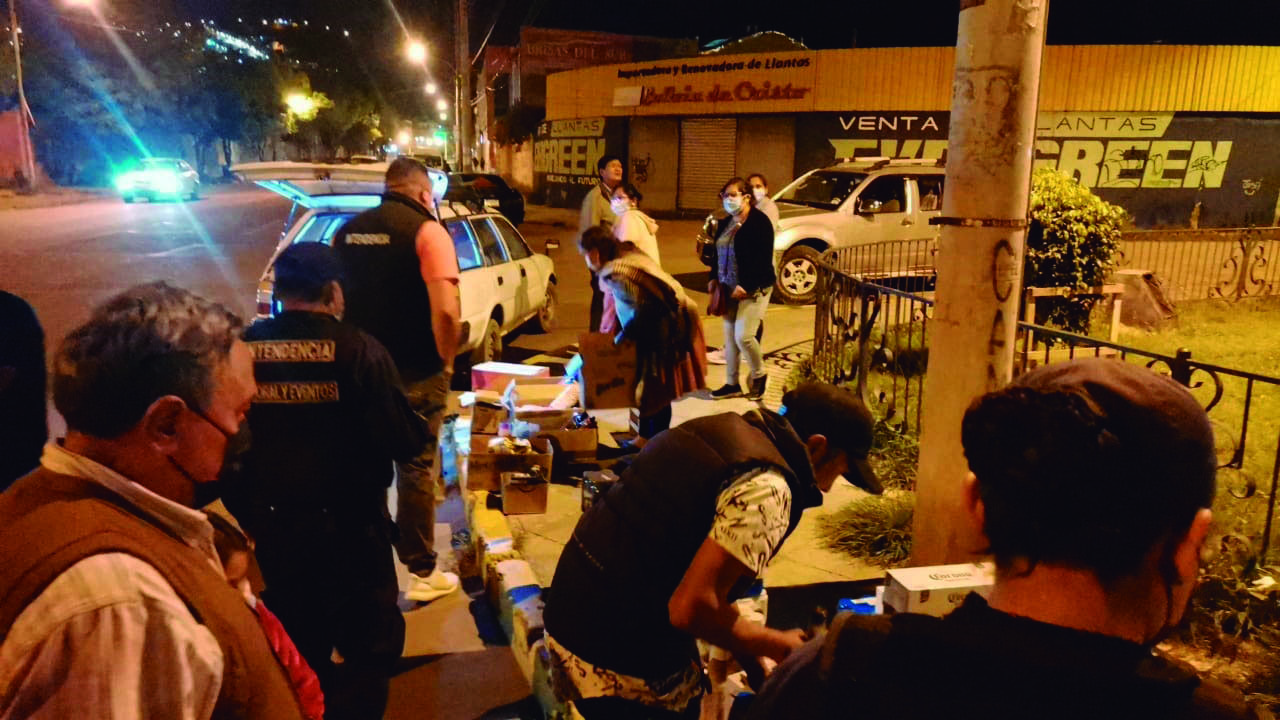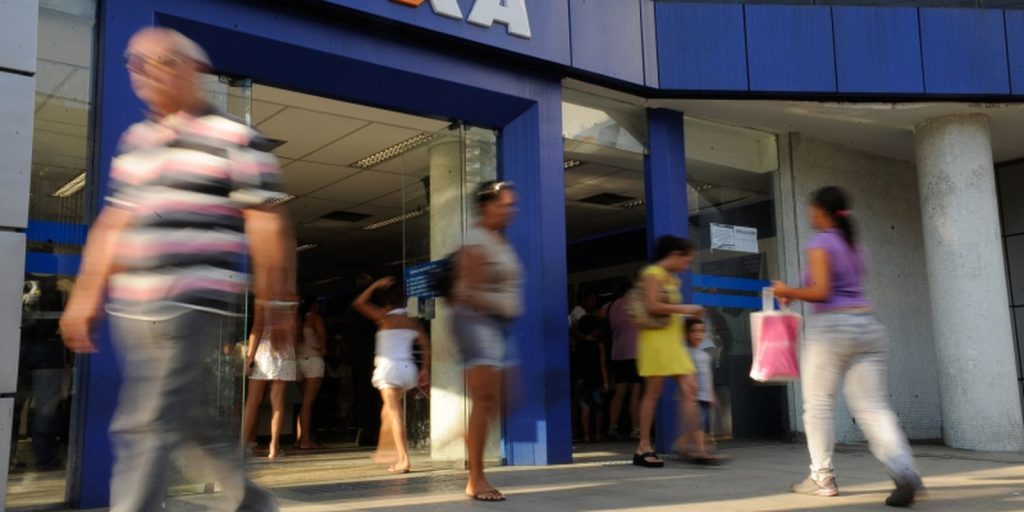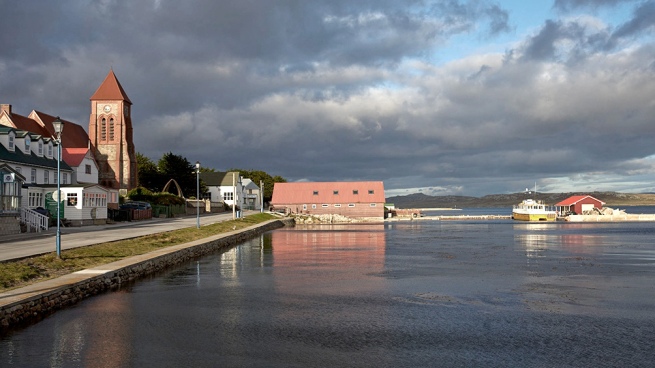Maria Mena M. / Cochabamba
It is itinerant and openly exhibits the illicit nature of the products that are marketed. The so-called “Smuggling Fair” in Cochabamba has been operating for two months and has been consolidated by evading the controls of both the Municipality of Cercado and the National Customs.
“This is Argentine, country girl. It’s cheaper and more profitable, ”says a shopkeeper who is trying to convince a woman to buy the bleach she offers. Obviously, there is a price difference: the five-liter bottle of the foreign brand is 30 bolivianos, while the national product costs 40 bolivianos. The choice was not difficult: the cheap cleaner won.
That bleach and various cleaning products, drinks, food, as well as contraband clothing, are offered at the mobile fair that has gained popularity in Cochabamba.
The products are offered by merchants who enter merchandise illegally through the borders of neighboring countries, such as Brazil, Argentina and Peru, mainly. They arrive in Bolivia after evading national controls -such as the National Customs and its operational arm, the Customs Operations Center- and avoiding inspections by governors and mayors.
“If Customs, with all the equipment and means it has, cannot stop this (smuggling), even less can we (the municipal guards). We only have one whistle to control traffic and merchants,” the municipal mayor of Cochabamba, Enrique Navia, assures Página Siete.
Itinerant and diurnal
For months, trucks and wagons loaded with boxes with merchandise have been traveling through different points of the city of Cochabamba offering a variety of contraband products: food, candy, drinks, cleaning products, personal hygiene and others at affordable prices, but without health registration.
In February, this illegal group of street vendors began to settle at night on Luis Uriona Avenue, near the ex-Toyocar Complex, in the southern zone, offering their contraband merchandise. The cheap prices of products that do not pay taxes were its main hook. Soon they no longer needed to go looking for buyers, as they came to the fair, which was also gaining popularity due to the wide variety of products on offer.
A few weeks later, the merchants were evicted from the place where they had settled by the Municipal Government of Cochabamba. The argument was that in addition to selling illegally imported merchandise, they did not have municipal permission to set up a fair in a public space.
But the measure did not last long. The vendors decided to move to Avenida 6 de Agosto and Mama Ocllo, from where they were also expelled by the municipal gendarmes. Then, to evade the controls, they installed themselves alternately in different sectors of the Llajta: on Beijing, Patria, National Reconstruction and Costanera avenues; in addition to markets and neighborhoods.
The fair that was initially set up at night, taking advantage of the darkness and the lack of municipal control, gradually became daytime. And currently it is installed in broad daylight in various areas.
“Smuggling fairs are now itinerant. One day they appear in one place and the next day in another. They are going out at night and during the day, we calculate that there are at least 2,000 people who are dedicated to this illegal business,” says Mayor Navia.
contraband is already installed
full daylight.
Photo: Cochabamba Municipal Government
merchants
“We do not sell in large quantities. We sell to people who need to buy cheap products because the pandemic has affected everyone, ”argues the salesman Adalid S. to justify his illegal business.
“I had a company and I went bankrupt because I had to continue paying taxes and salaries. So, I have preferred to leave my company. If the Mayor’s Office is willing to talk to us or give us our own space, we are willing to talk, we are not a problem, we want solutions,” says merchant Marcelo H.
Until 2020, he says, he was the owner of a legally established small business, but when the coronavirus pandemic hit, he was forced to close his company because he could not meet the tax and labor obligations required by law.
Marcelo is now dedicated to smuggling food, cleaning products and alcoholic beverages. Since he had a large vehicle, ideal for transporting merchandise, he only needed capital to start his new business. He does not want to talk about the route he uses to enter these products, but he assures that each trip “is dangerous.”

Photo: Intendancy
The scourge of smuggling
According to data from Fundempresa, in 2021 more than 5,000 companies were closed in Bolivia “hit”, mainly due to the effects of the pandemic. From the Federation of Private Companies and the Cochabamba Chamber of Industry they pointed to the “poor economic reactivation and smuggling” as the main causes.
According to studies by economic analyst Jaime Dunn, smuggling generates some 3.2 billion dollars and the State loses at least 650 million dollars each year due to tax and tariff evasion.
On April 7, the National Chamber of Industries (CNI) presented to the Chamber of Senators a bill that proposes to reduce from 200,000 to 10,000 UFV the value of taxes omitted to fight against smuggling. “Smuggling constitutes a threat against the productive fabric and formal employment,” justified the president of CNI, Ibo Blazicevic.
The risks
Although there are large price differences between contraband products sold at the fair and legal ones, those who buy them are exposed to risks due to lack of guarantees, added to the fact that they become part of the crime chain.
Claudia López, mother of a baby, says that every week she buys from the pharmacy an 800-gram can of milk from the Nutrilón 1 Premium brand for 180 bolivianos with an invoice. Every month she pays at least 700 bolivianos.
A week ago he accidentally came across the fair where a stall was exhibiting cans and boxes of Nutrilon. The can cost 120 bolivianos, 60 less than in the legal trade. The seller -without any fear- explained that the price variation is due to the fact that his product is contraband, but that it is “original” brought from the same manufacturer, “only” that evaded controls, records and intermediaries.
Claudia decided not to buy the formula without first consulting her baby’s pediatrician. Then, the professional explained that these cans of milk may be “original”, that they could have come directly from the factory, but because they did not comply with import regulations, there are no guarantees in their transport and handling, which lowers the quality. of the product.
“Perhaps when they were bringing the milk to Bolivia it could have fallen or the rain or the sun came. We don’t know how they were manipulated. So, even if I pay more, I decided to continue buying from the pharmacy because I have the guarantee that it will not harm my baby”, says Claudia now.
Mayor Navia agrees with the risks of consuming contraband products. “First of all, they do not have the registration of the National Agricultural Health and Food Safety Service (Senasag), it is not known how it was made or if it is suitable for consumption. The quality of the product is not known either, because food controls were not carried out and no one can guarantee if it is good, ”he warns.
Likewise, the Departmental Health Service and Senasag, separately, warn about the health risks of the use and consumption of food and products of dubious origin.
The fair that grows
Despite attempts to control the municipal guard, the Contraband Fair is consolidated in Cochabamba.
Last week, a group of vendors confronted municipal gendarmes who came to Beijing Avenue, where one of the illicit markets was being set up.
The gendarmes were received by the merchants with insults and some guards were even beaten and pushed in their control task.
They seized Bs 10 MM in contraband food
“So far this year, Customs has seized illegal merchandise through 2,687 strategic operations and 22 raids. 765 vehicles have been seized; appliances valued at almost Bs 12 million; new clothing and footwear equivalent to Bs 7.6 million; used clothing valued at Bs 5.6 million; alcoholic beverages valued at 4.5 million bolivianos and food at more than 10 million bolivianos”, reported the customs institution.
Beer is one of the most smuggled products. In Santa Cruz alone, 1,900 packages worth 180,000 bolivianos were destroyed; In Tarija, 54 tons of illegal beverages worth more than 426 thousand Bolivians were seized.
The difference between a can of nationally produced beer and another of contraband is notorious. An illegal can is sold for 3 bolivianos, while a national one costs 5 bolivianos. Other alcoholic beverages such as Fernet, singani, whiskey, rum and others at low prices, but without health registration, were also identified.
The municipal mayor of the Mayor’s Office of Cochabamba, Enrique Navia, highlights the importance of joint work between Customs, governments and municipalities to fight against smuggling. Otherwise, he warns, these products will continue to enter the country and cause severe damage to the formal economy.
“Customs must fulfill its function. We have notes that we send through the Chamber of Industry and we have had meetings with the Vice Minister for the Fight Against Smuggling, but if not everyone participates in this activity that takes away jobs, it will continue,” laments Navia.

Photo: Cochabamba Municipal Government
If Customs, with the equipment it has, cannot stop smuggling, even less so can the gendarmes.
Enrique Navia, Mayor
3,200MM
OF DOLLARS
generates contraband.
The state ceases to receive
$650 million
for tax evasion.


















